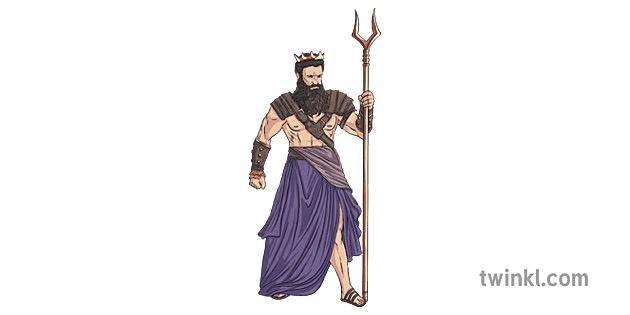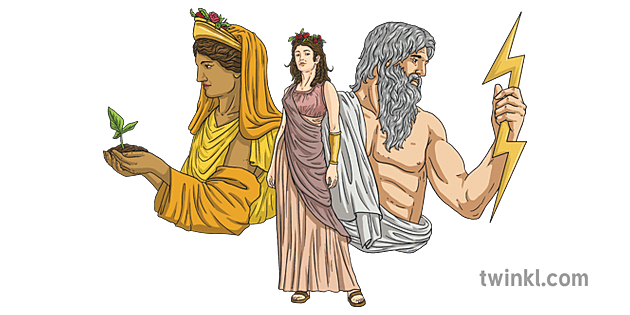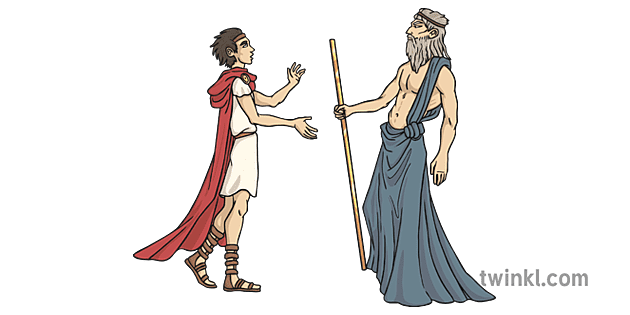


In ancient Greek religion, Hades was the god of the Underworld. He was a son of the Titans Cronus and Rhea, and brother of the deities Zeus and Poseidon.
When he was born, Hades’ father Cronus swallowed him to prevent a prophecy that a son would someday overthrow him. Eventually, his younger brother Zeus convinced Cronus to regurgitate his siblings and Hades was saved.

After this, Hades and his siblings dedicated themselves to war against the Titans, and when Cronus was overthrown by his children, his kingdom had to be divided up between them. During this process, Hades became the ruler of the Underworld along with his queen, Persephone.
The ancient Greeks believed that the Underworld was one of the three realms that make up the world. In this case, it is the world of the dead and a place where people's souls go after their death.

As the ruler of the Underworld, Hades was tasked with supervising the trial and punishment of wicked souls after their death.
Hades was depicted as a stern and pitiless ruler who did not show empathy and was unmoved by prayer or sacrifice. However, he was portrayed as passive and never negatively. He saw his role as maintaining a relative balance between good and evil.
Hades is typically portrayed holding a bident (two-pronged weapon, like a pitchfork) and wearing his helm (cap) with Cerberus, the three-headed guard dog of the Underworld, standing to his side.

Hades is depicted as one of the three most powerful Greek gods, alongside his brothers Posieden and Zeus.
As well as being immortal, the Greek god Hades could turn invisible by wearing a special cap. It is said he once allowed a hero named Perseus his helmet to help him defeat the monster called Medusa!
Persephone was Zeus and Demeter’s daughter. She was promised to Hades by her father, but she refused the position as queen of the Underworld. This angered Hades, who later kidnapped her!
This made her mother the goddess of crops and harvest extremely upset, leading to drought and famine in the world. Eventually, an agreement was made between the gods and Persephone had to stay in the Underworld for just a third of the year (4 months). This would later be known as winter, when few crops thrive.

One of the biggest rules of the Underworld was that no living souls were allowed to enter. Even so, there were stories of those who tried, and some of those who managed to escape.
Rather unusually, Orpheus, who was a wonderful singer, returned from the Underworld. When his wife died, he travelled to the Underworld to get her back.
Orpheus’ singing enchanted Hades so much that he agreed to let him have his wife back, but on one condition: Orpheus wasn’t allowed to look at his wife as they left the Underworld.
However, as they were leaving, Orpheus couldn’t resist looking behind him to check his wife was following, meaning she had to stay in the Underworld forever!

Twinkl is jam-packed with resources to help you teach about all the different Greek gods and goddesses!
If you're introducing the Greek god Hades to children, why not use this 'A Story about Hades PowerPoint'?
This PowerPoint tells the ancient Greek legend of Persephone, her parents and Hades.
Ancient Greek myths and legends feature a host of different fantasy creatures - from beautiful and magical to fierce and terrifying. Our PowerPoint explains Greek mythical creatures within the context of the mythology of Ancient Greece. KS2 children will love looking at this PowerPoint as a class or independently and taking a closer look at eight fascinating Greek mythical creatures.
Why not let your children improve their fine motor and concentration skills with this colouring sheet of Hades’ companion, Cerberus.
Use this brilliant Greek gods and goddesses quiz to help you test your class’ knowledge of the different Greek deities in a simple and effective way.
Multiple choice quizzes like this one are incredibly handy for quick assessments of your class' knowledge of a subject without the need for a full test or exam. The more relaxed nature of quizzes means that pupils may feel less pressure than they would do with other assessment types, and this can give you a surprisingly accurate representation of what they know about a topic!
Did you know that the award-winning Twinkl PlanIt has a whole scheme of work dedicated to ancient Greece for UKS2? It will teach your class about whom the ancient Greek people were when they lived and where and how they were able to establish their empire.
It covers how the political system worked in ancient Greece, investigates the legacy of Athenian Democracy and compares it with the political systems we have today.
The children also compare and contrast the modern-day Olympics with the Ancient Greek events, and use their mathematical skills to present their findings in the form of a Venn diagram.
What’s more, there’s even a lesson all about ancient Greek gods and goddesses that features a PowerPoint presentation, a lesson plan, marking grids, success criteria sheets, and more. Teaching the topic of the Ancient Greek gods and goddesses might seem like a daunting task, but this lesson pack makes planning your lesson easy!
Check out this handy video to learn some handy facts about ancient Greece that you can share with your children at school or at home!
If you enjoyed learning about Hades, the Greek god of the Underworld from this Teaching Wiki, you might like more of our pages:
Who were the Greek Gods and Goddesses?
Who were the Roman Gods and Goddesses?
Don’t hesitate to get in touch if you have any suggestions or ideas for resources. We love to hear from our lovely members and learn new ways to continue our mission to help all those who teach!